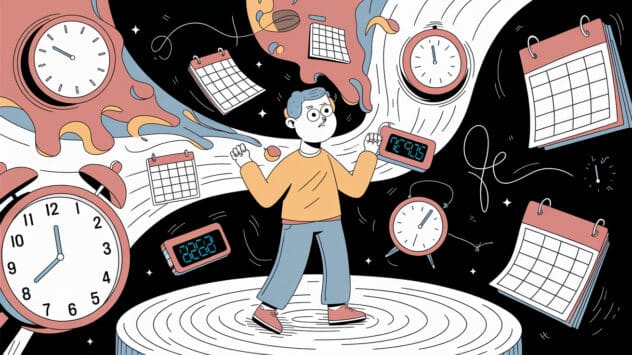Why Is My Partner So Defensive?
If you’re constantly walking on eggshells, getting blamed for everything, or feeling like every conversation turns into a battle, you might be asking yourself “why is my partner so defensive?“.
Defensiveness doesn’t just happen in a vacuum. It has a root cause. The real question is where is it coming from and what can you do about it.
We’re going to break down the biggest reasons people get defensive, what actually works, and what doesn’t. No fluff, no vague advice, just real solutions that help you make sense of this and decide what to do next.
Unlock peak brain performance with science-backed biohacks. Join free now & get your guide for just £4.99 (45% off)!

What’s Causing Their Defensiveness
Defensiveness is rarely just stubbornness. It usually comes from deeper issues in how someone processes emotions, experiences criticism, or handles conflict. Understanding the root cause makes it easier to decide how to approach the situation, or whether it is time to walk away.
ADHD or Autism (ASD)
Defensiveness often comes from difficulty regulating emotions, impulsive reactions, or struggling to process social interactions. Your partner may not even realise they are being defensive. It is often a knee-jerk reaction.
How to Identify It
- They interrupt, talk over you, or blurt out defensive statements before you have even finished speaking.
- They hyperfocus on irrelevant details in an argument instead of the bigger issue.
- They become agitated or shut down when overwhelmed, especially in loud or chaotic environments.
- They forget conversations or commitments, and when reminded, react with frustration or denial.
- They struggle with black-and-white thinking. If you express disappointment, they may assume you hate them completely.
- They overreact to perceived criticism, even when it is mild or constructive.
What This Means
Their defensiveness is more about brain wiring than intent. Their fight-or-flight response kicks in before they have a chance to process emotions logically.
People With Narcissistic Personality Disorder
A person with narcissistic personality disorder is defensive because they cannot accept blame or accountability, without feeling like their entire sense of self is under attack. Instead of acknowledging their role in a conflict, they shift the blame onto you.
How to Identify It
- Every issue becomes your fault, even when it is clearly their behaviour that caused the problem.
- They never actually apologise, or if they do, it is followed by excuses like, “I only did that because you made me.”
- They rewrite history, claiming things happened differently or that you are exaggerating.
- They gaslight you, making you doubt your memory or feel like you are the one in the wrong.
- They play the victim, even when they were the one who started the argument.
What This Means
Why is my partner so defensive? Their defensiveness is about protecting their self-image at all costs. You will never win an argument with logic or reasoning, because their brain refuses to process accountability.
Substance Abuse
When addiction is involved, defensiveness is usually a cover for guilt, shame, or withdrawal symptoms. They know they have a problem, but admitting it feels too overwhelming.
How to Identify It
- They are secretive about their drinking or drug use, and become hostile if questioned.
- They disappear for hours or days without explanation, then act defensive when confronted.
- They frequently break promises to cut back or stop, but insist they have things under control.
- They are unreliable, missing work, cancelling plans, or making reckless decisions.
- Their mood swings are extreme, and their defensiveness is worst when they are coming down from a substance.
What This Means
Defensiveness here is a symptom of addiction, not just personality. Their brain is chemically wired to protect the habit, even when they know it is harming them.
Emotional Immaturity
Some people are not neurodivergent, have nascissism, or are struggling with addiction. They are just emotionally stunted and react defensively because they lack self-awareness.
How to Identify It
- They refuse to take responsibility for anything, always blaming others for their problems.
- They sulk, shut down, or throw tantrums instead of discussing issues like an adult.
- They avoid difficult conversations completely, changing the subject or walking away.
- They make excuses for bad behaviour, saying things like, “That’s just how I am,” instead of working to change.
- They turn everything into a bigger drama, reacting with extreme emotions over minor things.
What This Means
Their defensiveness comes from a lack of emotional growth. They were never taught how to handle conflict and instead of learning, they default to childish reactions.
Trauma and Past Experiences (PTSD)
People with unresolved trauma can be highly defensive because their brain interprets conflict as a threat, even when it is not.
How to Identify It
- They react with extreme anger or fear, even when the conflict is minor.
- They assume you are attacking them, even when you approach things calmly.
- They struggle to trust people, and assume everyone has an agenda.
- They react emotionally first, then regret it later, but still find it hard to change.
- They are hyper-vigilant, always expecting criticism or betrayal.
If It’s ADHD or Autism
People with ADHD or autism often react defensively because they feel overwhelmed, ashamed, or misunderstood. Their brains process emotions differently and criticism, even when it’s small, can feel like a personal attack.
What Works
Reduce sensory overload before serious conversations
If they are overstimulated, they will not be able to have a rational discussion. Turn off the TV, dim the lights, and give them space to process before expecting a response.
Switch to written communication for tough topics
Why is my partner so defensive? ADHD brains often need time to process emotions before responding. A well written text gives them time to reflect instead of reacting impulsively.
Support dopamine levels
Defensiveness often spikes when dopamine is low. Dopamine plays a key role in impulse control, motivation, and emotional regulation. If your partner struggles with overreacting, impulsively lashing out, or shutting down when confronted, supporting dopamine levels can help them feel more stable, clear-headed, and able to process conversations rationally. Try supplements to help boost dopamine naturally.
How These Supplements Help
Omega-3s (EPA and DHA)
- Essential for brain health, mood stability, and reducing inflammation that can cause brain fog and emotional instability.
- Helps balance dopamine and serotonin, making it easier to regulate emotions.
- How to take: 1000–2000 mg daily. Look for a high EPA-to-DHA ratio (at least 2:1 EPA to DHA) for best results.
Magnesium (L-Threonate or Glycinate)
- Critical for calming the nervous system and reducing stress-induced defensiveness.
- Helps regulate dopamine receptors, making them more effective.
- Reduces restlessness, anxiety, and irritability that can cause defensive reactions.
- How to take: 200–400 mg daily before bed. Magnesium L-Threonate crosses the blood-brain barrier, making it the best option for cognitive and emotional benefits.
- A precursor to dopamine and norepinephrine, improving focus and emotional resilience.
- Supports clear thinking under stress, helping prevent knee-jerk defensive reactions.
- Helps with mental flexibility, making it easier to see different perspectives instead of reacting emotionally.
- How to take: 500–1000 mg on an empty stomach in the morning or before stressful situations.
- An adaptogen that boosts dopamine while reducing cortisol (stress hormone).
- Improves mental clarity, mood stability, and impulse control.
- Reduces fatigue-induced irritability, making it easier to stay calm and rational.
- How to take: 200–500 mg daily. Standardised extract should contain 3% rosavins and 1% salidroside for best effects.
Regular Exercise
- Increases dopamine production naturally, improving focus and emotional stability.
- Lowers stress and anxiety, making it easier to handle difficult conversations.
- Improves sleep and energy levels, preventing emotional exhaustion that leads to defensiveness.
- How to implement: Aim for 30 minutes of movement daily. High-intensity exercise boosts dopamine the most, but even a 10-minute brisk walk can help.
Avoid direct blame
Instead of saying “you never listen,” try saying “I feel like we keep missing each other when we talk. How can we fix this?” Their brain will process a solution faster than a confrontation.
What Doesn’t Work
- Forcing an immediate response. Their brain needs time to catch up emotionally. Give them space.
- Expecting deep eye contact during serious discussions. This makes autistic people even more uncomfortable and will not make them hear you better.
If It’s A Person With Narcissistic Personality Disorder
If your partner refuses to take accountability, always shifts the blame, and makes everything your fault, this is not normal defensiveness. It is manipulation.
What Works
Grey rocking
Stop reacting emotionally to their drama. Narcissists thrive on your reaction. If you stay neutral and boring, they lose interest.
Detach from their need for validation
They will never give you the acknowledgment you are looking for. Stop chasing it.
Call out the behaviour, not the person
Saying “I noticed when I brought up an issue, you immediately blamed me instead of addressing it” forces them to either self reflect or deflect. If they deflect, you have your answer.
What Doesn’t Work
- Trying to explain your feelings in depth. They will twist it to make themselves the victim.
- Hoping they will change. A person with narcissistic personality disorder will not change unless it benefits them.
If It’s Substance Abuse
Defensiveness around addiction comes from shame, denial, and withdrawal.
What Works
Track the windows of clarity
People struggling with addiction have moments where they feel guilty or open to help. These moments are your best chance to offer solutions.
Alternative Recovery Approaches
Why is my partner so defensive? Some people do better with harm reduction instead of going cold turkey. The goal is to gradually reduce substance dependence while supporting brain chemistry, reducing cravings, and making withdrawal more manageable.
NAD Therapy (Nicotinamide Adenine Dinucleotide)
What it is:
- NAD is a coenzyme essential for cellular energy production and brain repair.
- Helps restore dopamine balance and repair damage caused by substance abuse.
- Reduces cravings, withdrawal symptoms, and fatigue.
How it helps addiction:
- Alcohol and drug use deplete NAD levels, leading to brain fog, low motivation, and emotional instability.
- NAD infusions or supplements help replenish brain function, stabilise mood, and reduce substance cravings.
Where to get it:
- IV NAD therapy: Found at integrative medicine clinics, biohacking centres, and addiction recovery programs.
- NAD supplements: Available as NAD+, NR (Nicotinamide Riboside), or NMN (Nicotinamide Mononucleotide). Look for high-quality brands like Tru Niagen or Renue by Science.
- Best dosage:
- IV therapy: 500–1000 mg per session (used in detox clinics).
- Oral supplements: 300–600 mg daily for ongoing brain support.
Amino Acid Therapy
What it is:
- Substance abuse depletes neurotransmitters like dopamine, serotonin, and GABA.
- Amino acid therapy replenishes these neurotransmitters naturally.
How it helps addiction:
- L-Tyrosine and Mucuna Pruriens boost dopamine, reducing cravings and emotional crashes.
- L-Glutamine stabilises blood sugar, helping with alcohol cravings.
- 5-HTP and L-Tryptophan support serotonin, reducing anxiety and impulsivity.
- GABA and Theanine calm the nervous system, reducing withdrawal-induced anxiety.
Where to get it:
- High-quality amino acid supplements can be found on iHerb, Amazon, and health stores.
- Best dosage depends on the substance:
- Alcohol/drugs: L-Tyrosine (500–1000 mg), Mucuna Pruriens (15% L-Dopa), and L-Glutamine (500–2000 mg).
- Anxiety-based addiction: 5-HTP (50–100 mg) and GABA (250 mg).
Medication-Assisted Treatment (MAT) – Naltrexone & Other Options
What it is:
- Medications that help reduce cravings, block the effects of alcohol or drugs, and prevent relapse.
How it helps addiction:
- Naltrexone (used for alcohol and opioid addiction).
- Blocks opioid and alcohol receptors, making drinking or drug use feel less pleasurable.
- Reduces cravings over time.
- Acamprosate (Campral).
- Helps restore brain chemistry after quitting alcohol.
- Reduces withdrawal symptoms like anxiety and sleep problems.
- Baclofen.
- Used for reducing alcohol cravings and withdrawal anxiety.
Where to get it:
- Prescribed by doctors specialising in addiction medicine.
- Online MAT programs like Workit Health or Ria Health offer remote prescriptions.
- Naltrexone is available in pill form or as a monthly injection (Vivitrol).
Small habit changes
Heavy drinkers or drug users respond well to micro goal setting instead of drastic ultimatums.
Example: Instead of saying “you need to stop drinking,” say “try swapping one drink for a kombucha tonight.”
Encouraging movement and nutrition
Alcohol depletes B vitamins and dopamine crashes make cravings worse. Replenishing B vitamins, using adaptogens like ashwagandha, and cutting sugar can reduce cravings.
What Doesn’t Work
- Yelling or ultimatums during a period of heavy use. They are not in a logical state and will only react with more defensiveness.
- Guilt tripping them. People struggling with addiction already feel deep shame. They need a path to improvement, not a reminder of failure.
If It’s Emotional Immaturity
Why is my partner so defensive? Some people are not People struggling with addiction or narcissists. They are just emotionally stunted and react like children when confronted.
What Works
Use natural consequences
If they constantly forget things, stop reminding them. If they refuse to handle responsibilities, let them deal with the fallout.
Stop parenting them
If they expect you to fix everything, step back and make them figure it out.
Hold them accountable with facts, not emotions
Saying “this is the third time this has happened, what’s your plan to fix it?” forces them to take responsibility.
What Doesn’t Work
- Expecting deep self reflection. If they were capable of it, they would not be this emotionally immature.
- Fixing things for them. The more you do for them, the less they will ever do for themselves.
The Do’s and Don’ts for Handling Defensiveness
Do
- Recognise whether it is trauma, neurodivergence, addiction, or manipulation.
- Use nutrition, dopamine support, and movement to improve emotional regulation.
- Communicate differently based on how their brain works.
Don’t
- Try to therapy them into changing.
- Expect deep self reflection if they have never done it before.
- Chase validation from someone who refuses to give it.
Why is My Partner so Defensive: When to Walk Away
If your partner refuses to acknowledge their defensiveness, blames you, or continues patterns of manipulation, addiction, or immaturity, you have a choice to make.
- If they are willing to work on it, offer solutions and see if they take action.
- If they never take responsibility, stop wasting your energy.
- If they are abusive, manipulative, or gaslighting you, then your safety, mental and emotional, has to come first.
You do not win a prize for staying in a toxic situation just because you love someone. If they refuse to grow, you have every right to walk away and focus on your own well being.
Remember, unless you’re their actual therapist, then don’t take on that role.
Final Thoughts
Defensiveness in a relationship can be frustrating, but understanding why is my partner so defensive is the first step in deciding how to move forward. By recognising key traits and behaviours, you can make informed choices about whether to support, set boundaries, or walk away.
Trying to figure out “why is my partner so defensive” can feel overwhelming, but identifying the root cause of their defensiveness can help you regain clarity. Whether they need support, accountability, or firm boundaries, knowing what you’re dealing with is key.
Join the Herbal Biohacker Community for deeper insights, expert backed resources, and a space where you can ask the questions that matter. Reach out to any of the specialists on Herbal Biohacker if you need assistance navigating your relationship.







